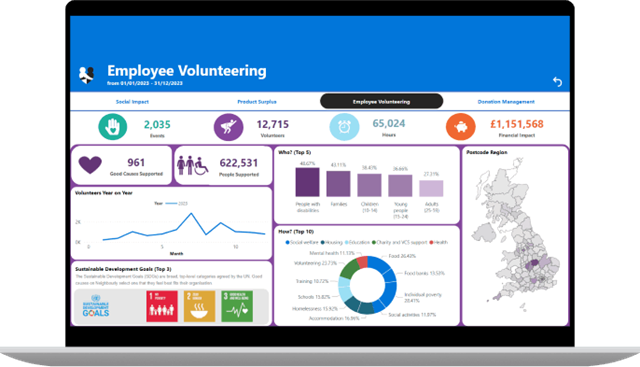
On 24 January 2024, the European Parliament announced the approval of a proposal to delay key aspects of the Corporate Sustainable Reporting Directive (CSRD) by 2 years, including the adoption of standards for companies to provide sector-specific sustainability disclosures and for sustainability reporting from companies outside of the EU.
This news was welcomed by many, as CSRD heralds a new era for businesses, compelling them to delve deeper into the social and environmental consequences of their actions. This blog explores the transformative implications of CSRD for in-scope businesses, shedding light on the enforcement mechanisms and the fundamental shift towards evaluating systemic impacts. Additionally, we examine how Neighbourly envisions the impact of CSRD on UK businesses not yet in scope, offering insights into the potential tiered landscape and the accelerated societal expectations it may bring.
Why is CSRD, and the introduction of reporting on social impact and the impact of their business models, such a significant change for in-scope businesses?
The Corporate Sustainability Reporting Directive requires companies to report on the impact of corporate activities on the environment and society, and requires the audit (assurance) of reported information. The introduction of CSRD marks a major shift for in-scope businesses by mandating expanded reporting. The directive has also extended criteria of in-scope businesses, significantly increasing the number of companies required to report on topics like environment, social issues, governance and more. Unlike previous voluntary and fragmented sustainability reporting, it introduces EU-wide standards that aim to consolidate and provide consistency around disclosures. This common framework increases clarity and cross-organisational comparability and most importantly, shared knowledge.
CSRD shifts focus to evaluating how companies address systemic impacts inherent in their daily activities. Double materiality is fundamental to the new rules; companies must report both on how their business is impacted by sustainability issues “outside-in” and how their activities impact society and the environment “inside-out”.
Also significant is the enforcement element - there will be enforceable repercussions, tied to bottom line, for non-compliant companies which will drive more urgent action from in-scope business leaders.
What does Neighbourly see as being the impact of CSRD on UK businesses who are not yet in scope?
Even for UK businesses not yet subject to CSRD mandates, the regulation is likely to begin to impact operations, or the business community will become two tiered, giving CSRD qualifying businesses a competitive advantage through robust and transparent sustainability credentials. As a consequence, companies will feel heightened stakeholder pressure as investors increasingly require validated proof of social and environmental consciousness and positive impact as a factor in their decisions. We may also see smaller UK firms preemptively adopt new industry standards to gain advantage and compete.
We’ve seen a real shift in talent acquisition towards purpose-driven brands in the past decade and CSRD could also accelerate this as employees continue to prioritise responsibility in their career choices. We are likely to see more stringent supply chain commitments as large corporations obligated under CSRD establish codes of conduct on issues like human rights that trickle down to their entire business ecosystem.
Sustainability is increasingly required for competitiveness, so a byproduct of CSRD will be accelerating societal expectations in this country, and encouraging businesses to start future-proofing.
The social requirements place a particular focus on reporting not only on workforce, workers in the value chain and end-users, but also ‘affected communities’. How might this be interpreted? How much of a shift does this represent from approaches of the past?
In the past, reporting on community considerations has tended to be limited in scope. CSRD mandates a deeper evaluation of systemic harms that business models indirectly impose on surrounding populations and environments.
To report on ‘affected communities’ companies will need to understand issues like health impacts from operational pollution/contamination, how policies affect things like inequality and human rights and where gains can be made through redistribution and circular economy practices. Leaders of in-scope companies will need to consider if their strategic choices and outputs are undermining or strengthening social support structures.
This assessment will go beyond suppliers, customers and traditional CSR initiatives to encapsulate risks and opportunities connected with corporate activity which marks a definite departure from past practice.
Given the companies in scope are the largest businesses, with multiple sites, could these requirements encourage a more place-based, community-focused approach?
Given CSRD's strong focus on understanding impacts on local communities, we do expect that large businesses will increasingly adopt place-based sustainability strategies because of the need to tailor approaches to the individual circumstances where they operate.
Getting it right will mean localising environmental, social and governance initiatives that take on distinct forms from one site or region to another, based on unique community insights and needs, versus a centralised, broad-brush approach.
In this way, we see the potential for CSRD to act as a catalyst for large corporates to embrace community-centred models that ultimately benefit regional economic inclusion, restoration and living standards.
Is there a risk of a ‘backlash’ against the burden of this expanded reporting?
There is certainly potential for some corporate backlash and criticism related to the reporting “burden” imposed by CSRD amongst newly in-scope companies. Executives may cite cost, resourcing and even confidentiality concerns.
However, the tide toward mandated sustainability accounting seems irreversible, so whilst expanded regulations inevitably impose some resource challenges and costs, businesses will want to view this as a strategic opportunity over the longer term. Factors including the phased timeline, consistency and standardisation of frameworks and reputational incentives should all help mitigate criticism. Proactive companies that develop rigorous impact reporting and disclosure processes will no doubt gain advantages.
How does Neighbourly’s impact reporting provide clients with the auditable data they’d need for CSRD?
As well as advisory services to help clients embed community investment and redistribution initiatives, Neighbourly offers comprehensive impact tracking and analytics that provide validated data required for CSRD disclosure across relevant areas. Importantly the platform captures individual transactions (not logged data) so it is a “data source of truth”:
Community investment metrics:
- Charitable contributions
- Volunteer hours donated
- Beneficiary numbers
- Impact themes supported
- Impact value
Local community impacts:
- Populations served
- Social need areas addressed
- UN Sustainable Development Goal alignment
Workforce engagement:
- % participation
- Per-capita hours
- Department/team breakdowns
- Wellbeing indicators
Environmental Impact:
- CO2 impact of surplus items redistributed
Key features like granular quantifiable metrics, customisable reports for multiple stakeholder needs, verified good cause partners, data transparency and exportability empower clients to produce robust, compliant disclosures.

Finally, any advice for businesses looking ahead to CSRD reporting, and possibly tackling social impact reporting (to this extent) for the first time?
Preparing to credibly disclose more robust details on social impacts can seem a daunting proposition for companies tackling these requirements for the first time. We’d recommend starting with laying the foundational building blocks:
- Audit the systems in place already and construct strong data gathering protocols employing digital tools to ease quantification. Leverage credible external partners and platforms where there’s opportunity to do so.
- Build cross-functional coordination around collating inputs - CSR should not be siloed
- Formalise community/stakeholder engagement mechanisms and solicit transparent feedback channels on your impacts.
Expanded social impact transparency can be viewed as an opportunity to enact purpose, accountability and resilience while meeting rising stakeholder demands. Absolute completeness from the outset matters less than showing momentum, and the path promises advantageous culture shifts and greater outcomes for people and planet.